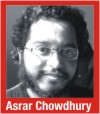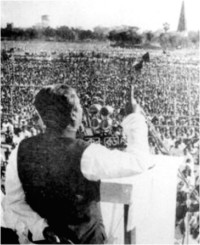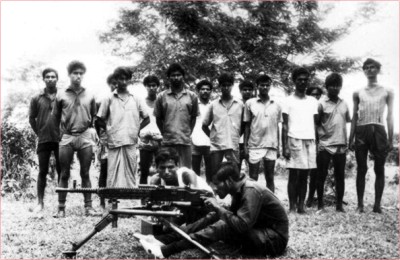| Spotlight
Our paths may differ, but our destination is the same

There's so much time to make up
Everywhere you turn
Time we have wasted on the way
-- Graham Nash, Wasted on the way
 The Indian Statesman, Gopal Krishna Gokhale once said, “What Bengal thinks today, India thinks tomorrow”. Small wonder. In Nobel Prizes alone, Bengal as a region has produced four laureatesRabindranath Tagore, Mother Teresa, Amartya Sen, and Muhammad Yunus. That's more than any other region in the entire sub-continent. What a contrast when one sees through another angle of the kaleidoscopic prism. The Indian Statesman, Gopal Krishna Gokhale once said, “What Bengal thinks today, India thinks tomorrow”. Small wonder. In Nobel Prizes alone, Bengal as a region has produced four laureatesRabindranath Tagore, Mother Teresa, Amartya Sen, and Muhammad Yunus. That's more than any other region in the entire sub-continent. What a contrast when one sees through another angle of the kaleidoscopic prism.
Modern day Bengal in Bangladesh was known as a bottomless basket in the 1970s, and the most corrupt nation in the final years of the twentieth century. What a grand way to finish off an old and start a new millennium! An even more contrast when one sees through another angle of the kaleidoscopic prism.
1971. In just 266 days, three million people sacrificed their lives to create a flag, a country, a ten-lettered word, BANGLADESH. This is just the human price Bangladesh paid for her freedom. Arithmetically, this stands at 7.83 lives per minute! Whichever side of the fence one belongs to, the absolute is clear. Bangladesh was born out of one of the bloodiest genocides in history.
It's the absolute, not the relative that makes Bangladesh so unique. It's here that our paths converge. It's here that our destination is the same. Here's another angle of the kaleidoscopic prism.
Did you know there's something like 32 variations in our folk music? Did you know that our Bhatiyali is based on the classical Khamwaj Raga? When most nations can show mostly qudratonic or pentatonic folk music, our Bhatiyali comes with a white rabbit from the magician's hat with a sampurna raga that includes all seven notes of the octave.
How many regions are there in this world where each season has its unique flowers, fruits and vegetables? And each season can boast a variety that matches the seven colours of the rainbow? Not too many. Bangladesh is truly unique in this rare league of nations.
If you didn't know the above, you do now.
It's only recently that the world is slowly finding out about Cox's Bazaar and the Sundarbans. For rightful reasons, these natural treasures should be included in the seven natural wonders of the world.
The list that has started can truly go on and on till the wee hours of the dawn. But that's not the objective of this story. The objective is to show that it's in the absolute, not the relative where our paths converge; our destination becomes the same. Yet another angle of the kaleidoscopic prism.
The greatest mystique poet of all times, Sheikh Jalaluddin Rumi wrote a powerful prose in his Table Talk. Rumi describes a pilgrimage. The pilgrims come from all different directions to the pilgrimage. They face different hardships on their way. Each different group has different stories to tell. After they finish offering their different souls to the altar they start to quarrel. Each different group argues that their path was the best and the hardest to the pilgrimage. All these relative arguments fail to see and appreciate the absolute. It's here that Rumi smiles with all his spirituality and Sufi wisdom. The pilgrims fail to see that their different paths lead them to the same destination, the pilgrimage where they all offered their souls to the same Creator. Rumi reminds us, our paths may differ, but our destination is the same.
On 26 March 2008, Bangladesh will complete 37 years of her existence as an Independent State. We live maximum seven to eight decades as humans, but societies live on for centuries. This is why 37 years isn't really that much time in a nation's history. Social changes can sometimes take decades or even centuries to accomplish into maturity. This is still not the objective of the story. The objective of this story is Rumi and his Sufi wisdom.
In the 37 years of our short existence we've debated one issue after another. We've failed to see what lies beneath our nose. The paths of the Brahmaputra, the Padma, and the Meghna differ, but they do meet. They meet at a common destination- The Bay of Bengal. No matter how different our paths may be, they meet at a common destination-Bangladesh.
There's so much water moving underneath the bridge
Let the water come and carry us away
-- Graham Nash, Wasted on the way
It took 214 years from Palassey in 1757 to reach Bangladesh in 1971. Many generations before us played their roles to give us a common stage to perform on; a stage called Bangladesh. The mantle of the soul and spirit of Bangladesh now rests on the shoulders of the generation of the Campus. It's this young generation that will, hopefully, take Bangladesh to her rightful place in the world stage.
Gopal Krishna Gokhale didn't make his observation from emptiness or for nothing. Many before him had inklings on the potential of Bengal and Bangladesh. Many still do. I happen to be one of them. It is true that we could have achieved more. It's also true that we do have achievements to show. Bangladesh isn't a bottomless basket. We have many unique things to show. Some of them have been shown here.
This story is a food for thought for the Campus. The generation that will take Bangladesh forward when we won't be around. Then we'll see through your eyes, speak through your minds and love through your hearts; like others have done through us and through many before us. The beauty of your generation is the greatest power of youth.
No matter how different our paths may be, our destination is the sameBangladesh. Whatever time we've wasted on the way, may the mighty waters of the Brahmaputra, the Padma, and the Meghna come and carry us away to the Bay of Bengal.
Shubho Shwadhinata Dibosh!
Asrarul Chowdhury teaches economics at Jahangirnagar, and North South University.
Independence Day: My Vision
Md. Rashidul Hasan
Bangladesh is a beautiful land with troubled history and a potentially bright future. It is one of the world's poorest countries, born out of a war and periodically ravaged by the forces of nature. After China and India, it has the largest number of poor people. In the northern district of Gaibandha, hunger is a common phenomenon. I have true stories of Monga, (also called Katimashi Akal), the seasonal poverty that is a curse for millions and that recurs every year. During the Bangla month of Kartik they don't have any job; these people become landless. They are forced to sell cattle and even their labor in advance. No job means no food; I've seen them eat leaves and herbs. I've even seen a mother trying to commit suicide, because she was unable to feed her baby. The baby was crying for food for days and then … This memory still haunts me in my dream. It's been thirty-seven years since our independence, but nothing has changed their fate excepting that they're given a fashionable name ultra-poor. In ten years time I want to see the poverty gone, as Prof Yunus has rightly said “poverty will be seen only in the museum”. I strongly believe it is possible if we can create jobs in the rural areas; Microfinance can be a way out.

Every year we are affected by natural disasters of one kind or other. Floods, cyclones and tornados have become part of our lives. They come like pirates and rob us of our lives, crops and whatever we've saved by the sweat of our brows. Even after decades nothing has been done to mitigate the sufferings of the affected. I know, we cannot stop the disasters from coming, but we can definitely build enough shelters where people can take refuge in the times of floods and cyclones. In ten years time we shall definitely have enough shelters so that there will be no loss of life through natural disasters. All the rivers will be dredged and network of canals will be dug. Buffer of food, medicine and other necessities will be created, so that when a disaster strikes we can help the affected people in time.
It is extremely unfortunate that our health service has not improved considerably since independence. People still die due to lack of timely and proper treatment. We have full-fledged-hospitals at all 64 districts and health complexes at 267 or so Thanas. All we need now is to put the right people there to make them effective and efficient. It is possible.
(BBA 11th Batch, UODA)
Copyright
(R) thedailystar.net 2008 |

